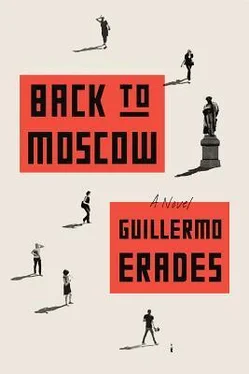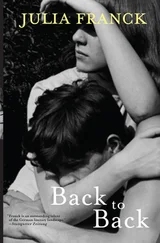‘When the hell was I supposed to buy you flowers?’
She didn’t answer. She lifted her glass, swirled it, drank all the wine at once. ‘Now it’s too late,’ she said, eyes down, shaking her head. ‘For you, I will always be Lena Propaganda.’
In a way, Lena, you were right. Now I know. Had we met anywhere else but Moscow — had there been no other Lenas in my mobile phone — things would have turned out differently. Truth is, Moscow brought us together, but Moscow kept us apart. What can I say now? Sorry, Lena, I wish I’d bought you flowers.
THREE WEEKS AFTER MOVING into my new flat, I decided to drop my language lessons. The daily commute to the university took up too much of my time — I had to free my agenda from unnecessary distractions.
I knew I would miss Nadezhda Nikolaevna. I would miss the hours in which we inhabited the structured world of language textbooks. I would miss her enthusiasm and dedication — which kept me awake, most of the time, despite my hangovers and chronic lack of sleep — and I would also miss the little sweets she brought me once a week, usually on Fridays — blinis, syrnikis, home-made preserves. She, too, must have felt sad about finishing our classes because she wept a little when we hugged goodbye after our last lesson.
Without language classes to attend, I only had to visit the university to see Lyudmila Aleksandrovna and discuss my research. Following my suggestion, and despite her initial resistance, we had now agreed to meet less often — once a month. She had taken some convincing though, as I hadn’t really told her about my plans to use the Russian women I met as a primary source for my research, an original approach I suspected she would disapprove of.
My discussions with Lyudmila Aleksandrovna, which covered the more orthodox aspects of my investigation, helped me understand the different interpretations that scholars had given to crucial events in Russian novels. Reading the articles she recommended, I understood that every Russian literature scholar had to develop an original opinion about the key moments of seminal novels.
Why, ultimately, had Anna Karenina thrown herself under a train?
This question was discussed at length in several papers, with so much fervour that I often wondered if the fact that Anna Karenina was a fictional character was lost on the authors. But talking to Lyudmila Aleksandrovna I realised it was expected of me, as a prospective expert on Russian literature, to come up with my own unique interpretation of these fictional events.
With my mornings free, I would now sit in central cafés to read Russian books with the help of a dictionary, taking notes in my little red notebooks. I tried to understand why Russian authors made their heroines behave the way they did and, ultimately, how these heroines tried to make sense of the world they lived in. In the long term, I thought, all I needed to do was to compare these notes with my observations on Russian women, which were conveniently written in the same red notebooks.
I gave a lot of thought, for instance, to Tatyana’s actions at the end of Evgeny Onegin . Her decision to reject Onegin, which seemed so true and inevitable in the context of the story, had originated, after all, in Aleksandr Sergeyevich’s mind — a mind moulded by his particular life experience.
Something worried me. When talking about Tatyana in the Pushkin Speech, Dostoyevsky had endowed her with the capacity to choose, the possibility to decide her own destiny. This didn’t feel totally credible. Not just because Tatyana is a literary character at the mercy of her creator — in itself a major obstacle to choosing your own path — but because, unlike in books, real life doesn’t always involve such clear choices.
And yet, any other ending to Evgeny Onegin — one in which Tatyana had not been presented with clear alternatives — would have lacked the literary quality that gave Pushkin’s work part of its greatness.
Tatyana’s story, her lesson to the world, only made sense as long as she had a choice.
WHEN I FIRST SAW YULYA Karma she was over by the fat Buddha statue, taking a break from dancing, leaning against the wall. Roundish Slavic face, enormous eyes. Even in the darkness of Karma’s underground dance floor, Yulya’s bright eyes, framed by thick eyeliner, resembled pure crystal. A glance at her eyes and I could feel a revolution raging in my chest, a horde of tiny Bolsheviks taking over my entire body, making Yulya the one concern of my night. I approached her and we chatted, and she seemed naive and shy, probably because her friends were around, I thought, and at some point she told me she was nineteen. When her friends were distracted at the bar, Yulya gave me her phone number, which she asked me to memorise without writing it down, so that nobody noticed. At the end of the night, just before heading out of the club, I found her again and, when nobody was looking, I stole a kiss. Her lips were full and soft and in the days that followed I couldn’t stop thinking about her.
We arranged to meet a couple of days later, at Pushkin’s statue. She was as beautiful as I remembered, even if, in plain daylight, her round figure was edging on plumpness. I took her to Pyramida. We had a drink and she told me about the elitni economics institute she attended, the best in Moscow, she said. She was interested in politics, and in what I, as a foreigner, thought about Russia’s shaky transition to democracy. She told me she read international newspapers online, to practise her English and to keep up with global affairs. I found her smart and witty but, the more she talked, the more I felt she was uncomfortable, as if something were nagging at the back of her mind. When we finished our drinks and our shared tray of sushi, I suggested we go to my place for a cup of tea.
‘Sure,’ she said, ‘but I have to tell you something.’
Then, as we walked through the perekhod, Yulya Karma informed me that first, she had a boyfriend, for two years now, and second, she didn’t intend to leave him. She did say first and second, and I imagined this formal way of conveying what she considered essential information was the result of her privileged schooling.
‘Right,’ I said, not knowing how to react.
‘And another thing,’ she added, as we came out on the other side of Tverskaya and walked towards my building. ‘Today I have my period.’
‘Your period?’
‘Yes,’ she said. ‘We won’t be able to have sex.’
I was taken aback.
Yulya clutched my arm.
‘It doesn’t mean that I can’t see you again another day,’ she said, smiling.
Up in my flat, I poured fresh water into the samovar and plugged it into the wall socket. While the samovar was heating up, I joined Yulya in the living room. She asked about the Indian tapestry on the wall. I told her the story of Lord Ganesh, how he got his elephant head, and how he used the small brush in his hand to remove obstacles from the path of life. I didn’t mention that the tapestry was a birthday present from Lena.
‘Interesno,’ Yulya said. ‘So you hung an elephant above your couch to make your life easier?’
‘It’s not an elephant. It’s a Hindu god. He brushes all my problems away.’
‘What a boring life you must have,’ she said, laughing.
The samovar rattled. Back in the kitchen, I carefully opened its tiny tap and poured boiling water into two mugs. I returned with the steaming mugs to the living room. While the tea was brewing, we stepped onto the balcony. Yulya was impressed by the view from my flat.
‘You can even see the New Arbat from here,’ she said, pointing at the cluster of buildings to the south.
‘I love how the buildings in the New Arbat look like open books,’ I said, as I stepped behind Yulya and put my hands around her waist.
Читать дальше












